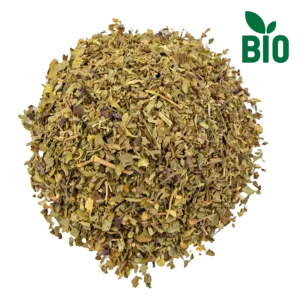Basil, the herb that stands out for its noble presence and the richness of its flavours and aromas. Among our organic herbs, basil is known for the strong character it imparts to every dish and enhances it with its outstanding freshness. Get ready for a journey into a world of taste, quality and purity through tofillo organic products.
“Discover in the following article the multiple properties and health benefits of basil, as well as its uses”
Scientifically known as Ocimum basilicum, it is one of the most popular herbs in world cuisine. More specifically, its characteristic aroma with a specific sense of freshness offers a unique taste experience. It is an herbaceous plant, perennial with rich aromatic foliage and small flowers. It belongs to the Lamiaceae family and has its roots in India and the tropical zone of Africa and Asia.
Photo: pixabay
Basil is known for the wonderful aroma and flavour it imparts in cooking. But how many people know its properties? In traditional medicine, its use is to treat headaches, diarrhea, coughs, kidney dysfunction, and it also has cardiotonic effects. At the same time, since ancient times people have used it as an insect repellent besides as a tea.

There are many varieties of basil and each of them differs in the size, colour and texture of the leaves, the colour of the inflorescence and the composition of the essential oils. Thus, the taste and smell vary from species to species, and so do the properties. In varying proportions, depending on the species, the essential oils of basil contain compounds such as linalool, eugenol, methyl chavicol, 1,8-cineole and myrcene. It also contains flavonoids, tannins, and vitamins A and C, offering aromatic, flavouring and medicinal properties.
Among other things, the history of the herb is very interesting. For Christians, basil is a sacred, blessed herb that takes its name from the Greek word “king”, that is, king, which in this case means Jesus Christ.
According to the Church Tradition, basil had grown in the place where the Holy Cross was buried and St. Helen discovered it thanks to its strong fragrance. At the same time, many say it has roots in India, where it was used in religious ceremonies. Later on, basil became known throughout the Mediterranean and thus took the leading role in Italian and Greek cuisine. Moreover, in English-speaking countries basil is also known as ‘St Joseph’s herb’.
Still, there are other myths regarding its origin.
Like that Alexander the Great brought the basil with him after their expedition to the Indies. The Greeks, however, did not hold the herb in high esteem. Because of its strong smell it attracted scorpions, so they considered it to be a kind of curse and a sign of death.
The Egyptians used basil, along with myrrh and frankincense, as a raw material in the embalming of dead pharaohs. For the Romans, on the other hand, it was the emblem of lovers. Dioscorides recommended the use of basil to treat dysuria, while its leaves were also suitable for treating insect and snake bites. Jewish folklore, believed to add strength, and in India, it is placed in the mouth of the deceased to ensure that it reaches God. Even today we know the age-old saying that “where there is basil, evil does not live”, meaning it brings good luck to a new household.
Photo: YelenaYemchuk
In tofillo, basil is an important element of the cuisine, offering a variety of taste experiences. We use it in salads, sauces and pastes, giving it a fresh and intense character. It adds a delicious flavour to various roasts, salads, braised dishes, soups and is a great addition to sauces based on fresh tomatoes. Whether fresh or dried, we add it at the last minute to preserve its aroma and enhance our dishes. That’s why many cookery writers call it the “king of herbs”.
As for its varieties, as we already mentioned above, there are many! The ones we find in our country are mainly:
Smelling our basil will awaken thousands of memories and scent new ones. Get the culinary herb here.
Basil, known for its aroma and taste, is an herb with a rich history and important health benefits. Beyond its use in the kitchen, its beneficial properties include antioxidant, anti-inflammatory and antimicrobial actions, making it valuable to our health.
Let’s take a closer look at its benefits:
Finally, through studies basil oil has shown antifungal and insect-repellent properties.
Photo: los_angela
Moreover, apart from its most famous use, that of cooking, basil can also be consumed as an aromatic herbal tea! A teaspoon of dried herb, a cup of hot water and 5 minutes is all it takes to make the perfect digestive drink. Perfect for drinking after our meal.
We use basil essential oil in perfumery, aromatherapy and also as an insect repellent.
Finally, many varieties, such as the leptophyllous here in Greece, are also available as ornamentals. Our grandmothers’ flower-filled verandas always contained a pot of basil, filling the images of our childhood with beautiful aromas!
Precautions
In case of pregnancy and in women who are breastfeeding, we always recommend the advice of a doctor.
Conclusion
In conclusion, from its medicinal use to modern cooking, basil remains one of the most beloved herbs. We, tofillo, honour the importance and character of the herb by offering you a taste journey through our organic herbs. Discover the world of herbs here and in a unique tasting experience.
Subscribe to our newsletter to stay informed about herbs, recipes, exclusive offers, and receive a 15% discount on your first order!

Ευχαριστούμε πολύ τα παρακάτω websites για τη συνδρομή τους σε επιπρόσθετο, ελεύθερο φωτογραφικό υλικό (free stock) που χρησιμοποιείται στην ιστοσελίδα μας:
Pixabay.com
Pexels.com
Unsplash.com
Freepik.com
Canva.com
Adobe.com
Σταύρος Δεβεράκης (Φωτογράφος)
Many thanks to the following websites for their subscription to additional, free stock photography used on our website:
Pixabay.com
Pexels.com
Unsplash.com
Freepik.com
Canva.com
Adobe.com
Stavros Deverakis (Photographer)